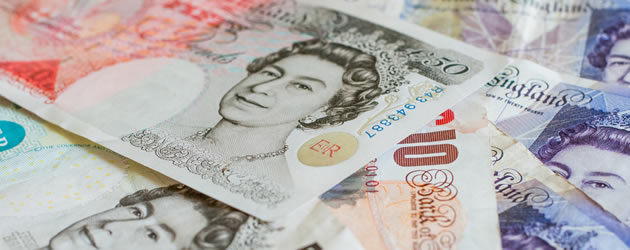- Sterling (GBP) Exchange Rates Edge Higher – EU referendum uncertainty continues to drive GBP exchange rates
- Euro (EUR) Rates Cool – ECB purchases junk debt
- UK Trade Data Positive – Provoke moderate Sterling gains
- GBP/EUR Forecast to Trend Statically – Market volatility cools as traders await EU referendum news
GBP Trims Declines After Inflation and Construction News
The Pound returned to trending just below the 1.28 level against the Euro following the release of better-than-forecast UK construction output data and an upwardly revised 12-month inflation projection from the Bank of England (BoE).
While Sterling wasn’t able to surge against the common currency in the wake of the reports, it was at least able to trim previous losses.
Next week’s UK inflation report is likely to be one of the main causes of GBP/EUR exchange rate volatility outside of the latest EU referendum related news.
Non-core inflation came in at 0.1% on the month in April but a stronger figure of 0.3% is forecast for May.
Year-on-year inflation of 0.4% is also expected.
(Previously updated 08:30 10/06/2016)
Given that domestic data has taken a backseat with regards to the provocation of Sterling exchange rate volatility, the latest positive trade balance data results had minimal impact on GBP exchange rates in the early stages of Thursday’s European session. This, combined with a distinct lack of high-impact European ecostats, caused the GBP/EUR exchange rate to trend narrowly as traders awaited the next inevitable EU referendum opinion poll result.
However, with EU referendum volatility easing due to a lack of fresh opinion polls, the positive trade balance result caused the GBP/EUR exchange rate to edge higher.
In the early stages of Friday’s European session the Pound Sterling to Euro (GBP/EUR) exchange rate was fluctuating between lows of 1.2724 and highs of 1.2805.
Tomorrow final German inflation data and the Bank of England’s 12 month inflation forecast are likely to be the main catalysts for GBP/EUR exchange rate movement.
(Previously Updated 09/06/16 @ 16:58)
Pound Sterling (GBP) Exchange Rates Mixed as ‘Brexit’ Uncertainty Drives Movement
The Pound Sterling to Euro (GBP/EUR) exchange rate was trending within a limited range on Thursday morning.
Mixed results from domestic data publications today caused the Pound to fluctuate versus its major peers, although a lack of volatility can be linked to EU referendum uncertainty and traders anticipating further opinion polls.
May’s RICS House Price Balance came in at 19%, significantly lower than the median market forecast 35%.
‘Sadly, for the many young people looking to enter the property market, it is unlikely that we are seeing the emergence of a more affordable market,’ said Simon Rubinsohn of RICS. ‘Instead, it appears to me that what we are looking at is a short term drop caused by the uncertainty resulting from the forthcoming EU Referendum coupled by a slow-down following the rush to get into the market ahead of the tax change on the purchase of investment properties.’
In contrast, however, April’s Trade Balance data saw the deficits for visible trade balance, non EU trade balance and total trade balance all narrow beyond expectations.
‘With the EU referendum on the horizon, both the Leave and Remain camps will likely look to twist this data to their own ends. Leave will argue the deficit is all the more reason for Britain to focus on trade relationships beyond Europe, while Remain will caution against the damage a Brexit could do to a trade deficit which is already causing concern,’ said economist Dennis de Jong. ‘Whichever way the June 23 vote goes, [George] Osborne faces a significant challenge to balance Britain’s trade in the face of weakening global demand and financial uncertainty.’
The Pound Sterling to Euro (GBP/EUR) exchange rate is currently trending in the region of 1.2730.
Euro (EUR) Exchange Rates Cool as ECB Rolls Out Corporate Bond Purchases
The combination of US Dollar appreciation – in response to safe-haven demand – and European Central Bank (ECB) bond purchases caused the Euro to soften versus the majority of its currency rivals.
Whilst ECB corporate bond purchases are designed to weaken the Euro, the single currency depreciation is more in response to uncertainties regarding the effectiveness of said purchases. This is especially true as it was revealed today that the central bank have no problem with buying junk debt like that of Telecom Italia.
‘This dispels any doubts investors may have had about the commitment of the ECB and the central banks to tackle lower-rated names,’ said Paris-based fund manager Alex Eventon. ‘Telecom Italia is firmly at the weak end of the spectrum the ECB can buy.’
European ecostats had minimal impact on the single currency despite registering mostly positive results. German trade balance data showed that the surplus narrowed far less-than-forecast in April.
Michael Nienaber, writing for Reuters, said;
‘The overall solid trade data, published by the Federal Statistics Office on Thursday, are likely to stir up a debate about how Germany’s relatively strong exports are continuing to fuel global economic imbalances. The International Monetary Fund (IMF) and the Organisation for Economic Cooperation and Development (OECD) have for years urged Germany to step up public and private investment in infrastructure to reduce its current account surplus.’
The Pound Sterling to Euro (GBP/EUR) exchange rate dropped to a low of 1.2684 during Thursday’s European session.
GBP/EUR Exchange Rate Forecast to Hold Steady on Reduced Volatility
Such has been the extent of Sterling volatility of late that traders seem to be taking a breather, with market movement significantly reduced in comparison to recent days. With that in mind, and given the absence of further domestic data publications, there is potential for the GBP/EUR exchange rate to continue trending within a limited range.
With that said, however, any significant developments in the EU referendum debate will likely cause Sterling volatility. Similarly, a surprising result from US labour market data could cause Euro changes.
The Pound Sterling to Euro (GBP/EUR) exchange rate reached a high of 1.2746 during Thursday’s European session.



